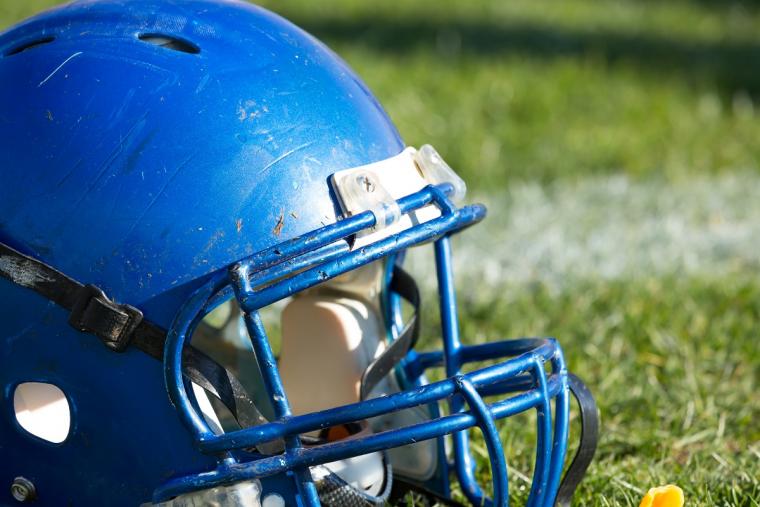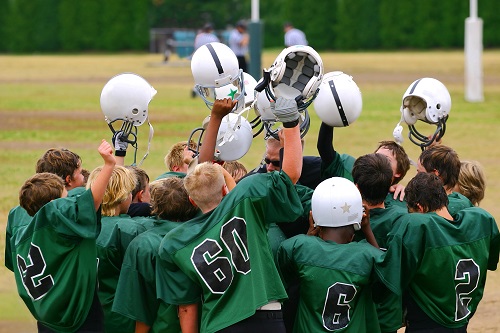
Many youth and high school football program leaders probably expected to start the 2022 season with a lack of referees — and they are. But they didn’t anticipate helmet shortages, too.
“This is the first time in the history of football for me,” Ted Ginn Sr., head football coach at Cleveland’s Glenville High School, told News5Cleveland.com. And he’s been coaching since 1976.
High schools around the country already have had to cancel games, citing a lack of equipment. Replacements for older or damaged helmets have gotten caught up in the same global supply chain, transportation and labor issues that have delayed delivery of everything from refrigerators and automobiles to vinyl records and plastic cups to consumers.
“While this environment has proven challenging for Riddell, it has also severely impacted other providers and their ability to service the marketplace,” football equipment manufacturer Riddell noted in a statement released July 28. “As the industry leader in this category, Riddell has proactively developed new capabilities to support participation growth and compensate for the instability in the football equipment landscape. Riddell strongly encouraged early ordering and reconditioning pick-ups to provide greater visibility into our workload. Riddell has worked diligently to both meet the increased marketplace demand and prioritize existing customers’ needs.”
The company added that it no longer is accepting new orders for the 2022 season and expects to ship at least 20% more youth helmets this year than it did in 2019, prior to the pandemic. Schutt, another prominent helmet maker, reportedly has taken similar action. According to WBOY.com in West Virginia, some football teams could be waiting until October to receive their helmet orders.
“We’ve got a lot of new players in the program who are eager to play football,” John Cantey, football coach at Bishop England High School in Charleston, S.C., told The Daniel Island News in mid-August. “But if we don’t get helmets until October, that means they can’t play in games. They can’t practice or play without helmets. We’ve had even more kids express interest in playing junior varsity in the last couple of weeks, but we can’t let kids come out for football at this stage of the season if they don’t have a football helmet.”
 According to Cantey, a typical new football helmet costs between $300 and $400, and of the team’s 115 helmets on hand, the only available ones are extra-large, which are too big for most JV players’ heads.
According to Cantey, a typical new football helmet costs between $300 and $400, and of the team’s 115 helmets on hand, the only available ones are extra-large, which are too big for most JV players’ heads.
“It’s not necessarily the helmet itself; it’s just some of the pieces [helmet manufacturers] can’t get,” Bob Moynihan, head football coach at Harlem (Ill.) High School, told WIFR.com. “If they can’t get those pieces, then they can’t finish the helmet.”
One Los Angeles-area coach speculated that part of the delay stems from coaches not sending their helmets to manufacturers for refurbishing after the pandemic-shortened 2020 season, which led to increased demand this offseason, according to the Los Angeles Times.
The Centers for Disease Control and Prevention recommends that football helmets be replaced no later than 10 years from their date of manufacture, although many need to be replaced much sooner than that. The organization also stipulates that helmets should be regularly reconditioned (including fixing cracks or other damage, replacing missing parts, testing for safety and then recertifying) by a licensed National Athletic Equipment Reconditioners Association member.
“Do not allow your athlete to use a used helmet that has not been recently recertified for use by a NAERA reconditioner,” the CDC cautions.
At this point, many football coaches are used to dealing with unforeseen obstacles that never would have been an issue prior to 2020 and doing what they can to make the most of an unfortunate situation.
“What we’ve tried to do is use our resources, contact our coaching friends that may not have the numbers that we have this year, and try to borrow helmets,” Sean Biser, head football at Morgantown (W.Va.) High School told WBOY.com. “The coaching community is pretty awesome. We’re pretty close-knit. We use our contacts. That’s the process we’re going through right now trying to make it work for us. We may not be wearing white helmets, but we’ll all have helmets on, and our kids will at least be able to play. At least until our shipment comes in. … We’re just trying to have a plan to overcome the adversity that’s been thrown at us.”

